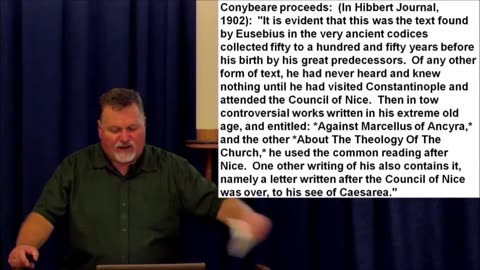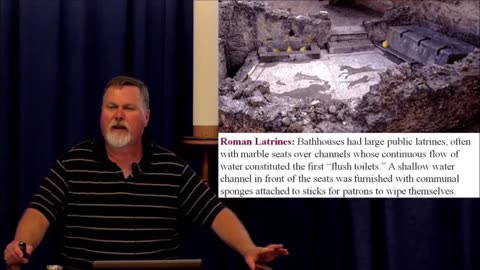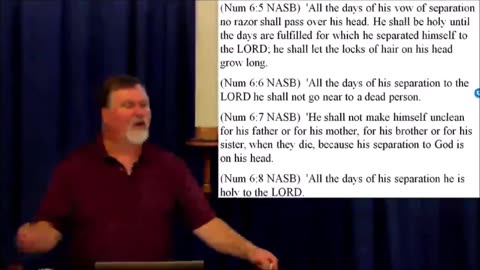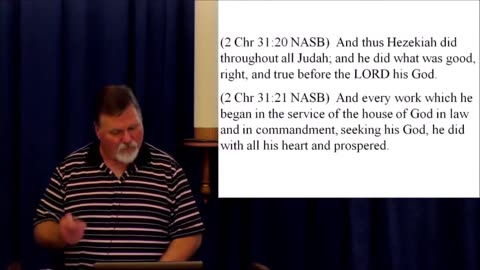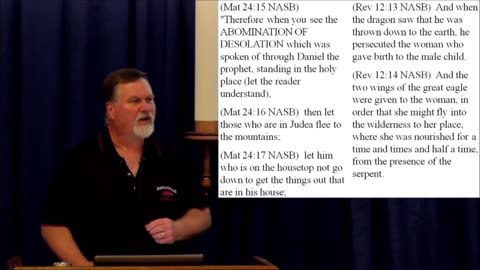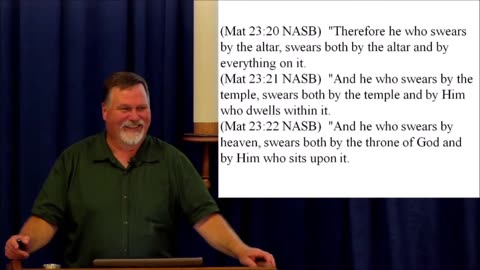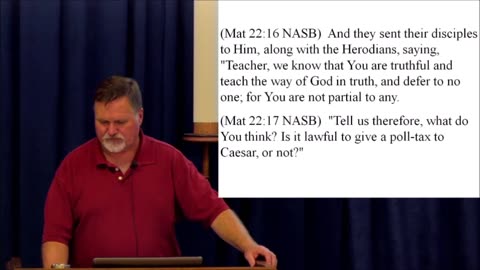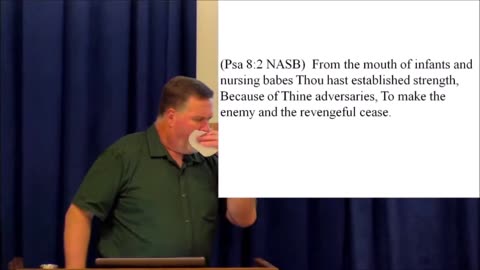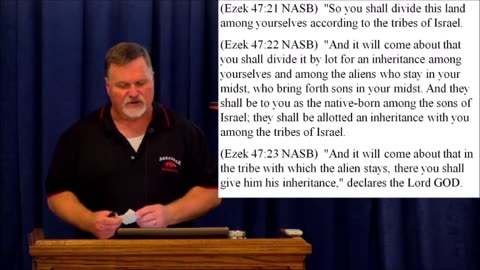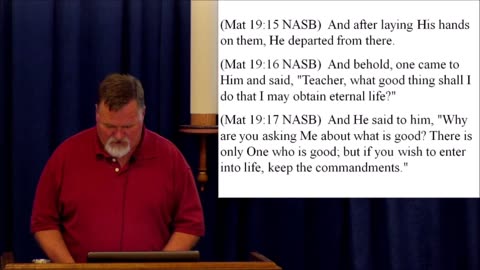-
Matt 28 - Mat 28:18-20 - Profound "Trinitarian" passages in Scripture.
 RVTAMat 28:18 And Jesus came up and spoke to them, saying, "All authority has been given to Me in heaven and on earth. Mat 28:19 Go therefore and make disciples of all the nations, baptizing them in the name of the Father and the Son and the Holy Spirit, Mat 28:20 teaching them to observe all that I commanded you; and lo, I am with you always, even to the end of the age." This is one of the profound "Trinitarian" passages in Scripture. However, the Shem Tov reads differently: (Matt. 28:18 Shem Tov) Yeshua drew near to them and said to them: To me has been given all power in heaven and earth. (Matt. 28:19 Shem Tov) Go (Matt. 28:20 Shem Tov) and (teach) them to carry out all the things which I have commanded you. I am not a huge proponent of the Shem Tov. However, one distinct problem we have is that the extremely ancient copies of Matthew are missing the last chapter or two. So we cannot confirm the precise wording of this text by looking at the oldest manuscripts. The witness of Eusibius is very compelling: According to Conybeare: "Eusebius cites this text of Matthew 28:19 again and again in works written between 300-336AD, namely in his long commentaries on the Psalms, on Isaiah, his Demonstration Evangelica, his Theophany, ...in his famous history of the Church, and in his panegyric of the emperor Constantine. I have, after a moderate search in these works of Eusebius, found eighteen citations of Matthew 28:19, and always in the following form: *Go ye and make disciples of all nations in my name, teaching them to observe all things, whatsoever I commanded you.*" Conybeare proceeds: (In Hibbert Journal, 1902): "It is evident that this was the text found by Eusebius in the very ancient codices collected fifty to a hundred and fifty years before his birth by his great predecessors. Of any other form of text, he had never heard and knew nothing until he had visited Constantinople and attended the Council of Nice. Then in two controversial works written in his extreme old age, and entitled: *Against Marcellus of Ancyra,* and the other *About The Theology Of The Church,* he used the common reading after Nice. One other writing of his also contains it, namely a letter written after the Council of Nice was over, to his see of Caesarea." We know that after the ascension of Yeshua people were baptized in the name of Yeshua Messiah, not according to any trinitarian recipe Acts 2:38, 8:16, 10:48, 19:5).21 views
RVTAMat 28:18 And Jesus came up and spoke to them, saying, "All authority has been given to Me in heaven and on earth. Mat 28:19 Go therefore and make disciples of all the nations, baptizing them in the name of the Father and the Son and the Holy Spirit, Mat 28:20 teaching them to observe all that I commanded you; and lo, I am with you always, even to the end of the age." This is one of the profound "Trinitarian" passages in Scripture. However, the Shem Tov reads differently: (Matt. 28:18 Shem Tov) Yeshua drew near to them and said to them: To me has been given all power in heaven and earth. (Matt. 28:19 Shem Tov) Go (Matt. 28:20 Shem Tov) and (teach) them to carry out all the things which I have commanded you. I am not a huge proponent of the Shem Tov. However, one distinct problem we have is that the extremely ancient copies of Matthew are missing the last chapter or two. So we cannot confirm the precise wording of this text by looking at the oldest manuscripts. The witness of Eusibius is very compelling: According to Conybeare: "Eusebius cites this text of Matthew 28:19 again and again in works written between 300-336AD, namely in his long commentaries on the Psalms, on Isaiah, his Demonstration Evangelica, his Theophany, ...in his famous history of the Church, and in his panegyric of the emperor Constantine. I have, after a moderate search in these works of Eusebius, found eighteen citations of Matthew 28:19, and always in the following form: *Go ye and make disciples of all nations in my name, teaching them to observe all things, whatsoever I commanded you.*" Conybeare proceeds: (In Hibbert Journal, 1902): "It is evident that this was the text found by Eusebius in the very ancient codices collected fifty to a hundred and fifty years before his birth by his great predecessors. Of any other form of text, he had never heard and knew nothing until he had visited Constantinople and attended the Council of Nice. Then in two controversial works written in his extreme old age, and entitled: *Against Marcellus of Ancyra,* and the other *About The Theology Of The Church,* he used the common reading after Nice. One other writing of his also contains it, namely a letter written after the Council of Nice was over, to his see of Caesarea." We know that after the ascension of Yeshua people were baptized in the name of Yeshua Messiah, not according to any trinitarian recipe Acts 2:38, 8:16, 10:48, 19:5).21 views -
Matt 27 - …darkness fell upon all the land until the ninth hour. A solar eclipse was not possible.
 RVTAMat 27:45 Now from the sixth hour darkness fell upon all the land until the ninth hour. Some people claim that this was a solar eclipse, but that is not possible. There was a full moon at the time of Passover and a solar eclipse can only occur at the time of a New Moon. This was purely a supernatural event. This event was recorded as having happened by others in that day: Phlegon was a historian who lived in the first century. There are two books credited to his name: Chronicles and the Olympiads. Little is known about Phlegon but he made reference to Christ. The first two quotes are unique to Origen and the last quote below is recorded by Origen and Philopon. Phlegon mentioned the eclipse which took place during the crucifixion of the Lord Jesus and no other (eclipse); it is clear that he did not know from his sources about any (similar) eclipse in previous times . . . and this is shown by the historical account of Tiberius Caesar. - De. opif. mund. II21 Thallus (circa AD 52) wrote a history about the middle east from the time of the Trojan War to his own time. The work has been lost and the only record we have of his writings is through Julius Africanus (AD 221). Below Julius Africanus refers to Christ's crucifixion and the darkness that covered the earth prior to his death. "This darkness Thallus, in the third book of his History, calls, as it appears to me without reason, an eclipse of the sun. For the Hebrews celebrate the Passover on the 14th day according to the moon, and the passion of our Savior falls on the day before the Passover; but an eclipse of the sun takes place only when the moon comes under the sun. And it cannot happen at any other time but in the interval between the first day of the new moon and the last of the old, that is, at their junction: how then should an eclipse occur when the moon is almost diametrically opposite the sun?" Although they erroneously thought this event was an eclipse, these quotes by ancient historians definitely point to the event and attempts at describing and explaining it at or near the time it happened.23 views
RVTAMat 27:45 Now from the sixth hour darkness fell upon all the land until the ninth hour. Some people claim that this was a solar eclipse, but that is not possible. There was a full moon at the time of Passover and a solar eclipse can only occur at the time of a New Moon. This was purely a supernatural event. This event was recorded as having happened by others in that day: Phlegon was a historian who lived in the first century. There are two books credited to his name: Chronicles and the Olympiads. Little is known about Phlegon but he made reference to Christ. The first two quotes are unique to Origen and the last quote below is recorded by Origen and Philopon. Phlegon mentioned the eclipse which took place during the crucifixion of the Lord Jesus and no other (eclipse); it is clear that he did not know from his sources about any (similar) eclipse in previous times . . . and this is shown by the historical account of Tiberius Caesar. - De. opif. mund. II21 Thallus (circa AD 52) wrote a history about the middle east from the time of the Trojan War to his own time. The work has been lost and the only record we have of his writings is through Julius Africanus (AD 221). Below Julius Africanus refers to Christ's crucifixion and the darkness that covered the earth prior to his death. "This darkness Thallus, in the third book of his History, calls, as it appears to me without reason, an eclipse of the sun. For the Hebrews celebrate the Passover on the 14th day according to the moon, and the passion of our Savior falls on the day before the Passover; but an eclipse of the sun takes place only when the moon comes under the sun. And it cannot happen at any other time but in the interval between the first day of the new moon and the last of the old, that is, at their junction: how then should an eclipse occur when the moon is almost diametrically opposite the sun?" Although they erroneously thought this event was an eclipse, these quotes by ancient historians definitely point to the event and attempts at describing and explaining it at or near the time it happened.23 views -
Matt 26 - So me people claim that Yeshua was crucified on a Friday, but that is not possible.
 RVTAMat 26:2 "You know that after two days the Passover is coming, and the Son of Man is to be delivered up for crucifixion." Now, if we have this timing correct, this is on a Tuesday and Passover is on Thursday in 32 AD.. Some people claim that Yeshua was crucified on a Friday, but that is not possible. We are told in John 11:54 to John 12:1 that Yeshua traveled from Bethany to Jerusalem six days previous. That means He would have walked at least 15 miles as the crow flies on that day. It was probably closer to 25 miles or more since waterways had to be crossed. If Yeshua were crucified on a Friday, six days previous would have been on the Sabbath Day. He probably would not have traveled that far on the Sabbath. Paul sometimes made it a point not to travel on the Sabbath. Yeshua would have done the same unless it was absolutely necessary. Many claim that Passover in 32 AD would have been on a Sunday, Monday, or Tuesday. It is difficult to say precisely what day of the week Passover would have been on in the past. Sir Robert Anderson, Chief Inspector of Scotland yard said that Passover was on Thursday in 32 AD. I think his findings are as good as any.12 views 1 comment
RVTAMat 26:2 "You know that after two days the Passover is coming, and the Son of Man is to be delivered up for crucifixion." Now, if we have this timing correct, this is on a Tuesday and Passover is on Thursday in 32 AD.. Some people claim that Yeshua was crucified on a Friday, but that is not possible. We are told in John 11:54 to John 12:1 that Yeshua traveled from Bethany to Jerusalem six days previous. That means He would have walked at least 15 miles as the crow flies on that day. It was probably closer to 25 miles or more since waterways had to be crossed. If Yeshua were crucified on a Friday, six days previous would have been on the Sabbath Day. He probably would not have traveled that far on the Sabbath. Paul sometimes made it a point not to travel on the Sabbath. Yeshua would have done the same unless it was absolutely necessary. Many claim that Passover in 32 AD would have been on a Sunday, Monday, or Tuesday. It is difficult to say precisely what day of the week Passover would have been on in the past. Sir Robert Anderson, Chief Inspector of Scotland yard said that Passover was on Thursday in 32 AD. I think his findings are as good as any.12 views 1 comment -
Matt 25 - What is oil according to Scripture?
 RVTAThis chapter is to be taken in context of the way the previous chapter ends. Yeshua was just saying that we are not to be "asleep" or act as if we are unawares. This is a reference to keeping Torah in our lives. Mat 25:1 "Then the kingdom of heaven will be comparable to ten virgins, who took their lamps, and went out to meet the bridegroom. Mat 25:2 "And five of them were foolish, and five were prudent. Elohim is dividing up the ten virgins into ones that are foolish and ones that are prudent. Who are the "virgins" being spoken of here? The way to interpret this parable is the same as interpreting other parables and prophecy. We should use Scripture to interpret this for us. A virgin is often a reference to Israel 2 Kings 19:21, Jer 14:17, 31:21). However a virgin can also be from Babylon or Egypt (Jer 46:11, Isaiah 47:1). However, all of the virgins in this parable have lamps. According to Scripture a lamp is the Word of Elohim, especially His commandments Psalm 119:105, 43:3, Prov 6:3). Peter speaks of the Word of Elohim being a lamp also 2 Peter 1:19). Therefore the virgins with lamps is speaking of Israel. Yeshua says that five of the virgins were "foolish." The word really means "stupid." Strong's Concordance # 3474. moros, mo-ros'; prob. from the base of G3466; dull or stupid (as if shut up), i.e. heedless, (mor.) blockhead, (appar.) absurd:--fool (-ish, X -ishness). The other five virgins are described as "prudent." The Greek word denotes wisdom (NASC Conc.) "G5429. Phronimos, from G5426; practically wise, sensible:-- more shrewd(1), prudent(5), sensible(2), shrewd(1), wise(4), wise men(1)." Mat 25:3 "For when the foolish took their lamps, they took no oil with them, We are told that the foolish virgins had their lamps, but they did not take any oil. What is oil according to Scripture? Many state that it is the Spirit. But that analogy is not in Scripture. If it is, I could not find it. Symbolically, oil refers to reproof from Scripture (Psalm 141:5). The aforementioned passage of Prov 6:23 mentions that the commandments being a lamp and reproof a way of life. Reproof from Scripture is essentially righteousness in our lives ( Psalm 45:7). This does fit other Scriptures which state that Scriptural reproof is for the wise, but is hated by the foolish (Prov. 9:8-10, 13:18, 15:5, 19:25, 25:12, Rev 3:19, Job 5:17, Psalm 94:12). It is the "foolish" who reject the Torah of Elohim (Prov. 21:20, Jer 5:21, Luke 24:25). It is with oil that priests were consecrated (set apart) in service to Elohim (Lev 8:12, Ex. 28:41, 30:30). Soooo. If we examine this passage according to Scripture, it is saying that there are ten people, all with the Word of Elohim. But five of them, although they had the Word of Elohim, were not interested in righteousness or correction and reproof. The very term in the Greek for "foolish" means "heedless." They did not heed the Word which they had. Mat 25:4 but the prudent took oil in flasks along with their lamps. The prudent ones are those who have the oil of righteousness and live accordingly.21 views
RVTAThis chapter is to be taken in context of the way the previous chapter ends. Yeshua was just saying that we are not to be "asleep" or act as if we are unawares. This is a reference to keeping Torah in our lives. Mat 25:1 "Then the kingdom of heaven will be comparable to ten virgins, who took their lamps, and went out to meet the bridegroom. Mat 25:2 "And five of them were foolish, and five were prudent. Elohim is dividing up the ten virgins into ones that are foolish and ones that are prudent. Who are the "virgins" being spoken of here? The way to interpret this parable is the same as interpreting other parables and prophecy. We should use Scripture to interpret this for us. A virgin is often a reference to Israel 2 Kings 19:21, Jer 14:17, 31:21). However a virgin can also be from Babylon or Egypt (Jer 46:11, Isaiah 47:1). However, all of the virgins in this parable have lamps. According to Scripture a lamp is the Word of Elohim, especially His commandments Psalm 119:105, 43:3, Prov 6:3). Peter speaks of the Word of Elohim being a lamp also 2 Peter 1:19). Therefore the virgins with lamps is speaking of Israel. Yeshua says that five of the virgins were "foolish." The word really means "stupid." Strong's Concordance # 3474. moros, mo-ros'; prob. from the base of G3466; dull or stupid (as if shut up), i.e. heedless, (mor.) blockhead, (appar.) absurd:--fool (-ish, X -ishness). The other five virgins are described as "prudent." The Greek word denotes wisdom (NASC Conc.) "G5429. Phronimos, from G5426; practically wise, sensible:-- more shrewd(1), prudent(5), sensible(2), shrewd(1), wise(4), wise men(1)." Mat 25:3 "For when the foolish took their lamps, they took no oil with them, We are told that the foolish virgins had their lamps, but they did not take any oil. What is oil according to Scripture? Many state that it is the Spirit. But that analogy is not in Scripture. If it is, I could not find it. Symbolically, oil refers to reproof from Scripture (Psalm 141:5). The aforementioned passage of Prov 6:23 mentions that the commandments being a lamp and reproof a way of life. Reproof from Scripture is essentially righteousness in our lives ( Psalm 45:7). This does fit other Scriptures which state that Scriptural reproof is for the wise, but is hated by the foolish (Prov. 9:8-10, 13:18, 15:5, 19:25, 25:12, Rev 3:19, Job 5:17, Psalm 94:12). It is the "foolish" who reject the Torah of Elohim (Prov. 21:20, Jer 5:21, Luke 24:25). It is with oil that priests were consecrated (set apart) in service to Elohim (Lev 8:12, Ex. 28:41, 30:30). Soooo. If we examine this passage according to Scripture, it is saying that there are ten people, all with the Word of Elohim. But five of them, although they had the Word of Elohim, were not interested in righteousness or correction and reproof. The very term in the Greek for "foolish" means "heedless." They did not heed the Word which they had. Mat 25:4 but the prudent took oil in flasks along with their lamps. The prudent ones are those who have the oil of righteousness and live accordingly.21 views -
Matt 24 – What is the "Olivet Discourse?"
 RVTAMat 24:1 And Jesus came out from the temple and was going away when His disciples came up to point out the temple buildings to Him. Yeshua announced in the last three verses of Chapter 23 that He will not establish His kingdom at this time, but will come again to establish it. Yeshua told them in Matt. 23:38 that the temple would be left desolate. This temple that they have just left was being built by Herod and was still under construction. This temple was constructed of white marble and was a magnificent structure. The disciples are disturbed at this statement by Yeshua so they come to Him, wanting to show Him around the many buildings that comprise the temple. Mat 24:2 And He answered and said to them, "Do you not see all these things? Truly I say to you, not one stone here shall be left upon another, which will not be torn down." "...Do you not see all these things?" The disciples thought they saw it, so they asked Yeshua to take a look. But Yeshua says "Do you REALLY see it?" History tells us that the wailing wall in Jerusalem is comprised of the ancient stones from structures that had previously been erected. However, it is visually apparent that the wall is made up of many different types of stones. Excavations in the area of the temple show stones of different composition also. This shows us that literally, "no stone was left overturned" in the destruction of this temple. It was torn to pieces and scattered. This was a shock to the disciples who probably talked it over and came to Yeshua with three questions. Mat 24:3 And as He was sitting on the Mount of Olives, the disciples came to Him privately, saying, "Tell us, when will these things be, and what will be the sign of Your coming, and of the end of the age?" The three questions were (1.) When will these things (the destruction of the temple) be? (2.) What will be the sign of your coming? (3.) What will be the sign of the end of the age? Yeshua is going to answer these three questions and we call His answers the "Olivet Discourse" because it took place on the Mount of Olives. The answer to the first question is best answered in the same discussion written by Luke (Luke 21:20-24). Yeshua made this prophecy long before it was fulfilled in the years 70A.D. to 135 A.D. In Luke 21:24, Yeshua said that Jerusalem will be trodden down by the Gentiles until "the times of the gentiles be fulfilled." Jerusalem has not been trodden down by the Gentiles since they took it away from the Arabs in 1967. This apparently means that the times of the Gentiles has been fulfilled. The next two verse in Luke tell us the condition of things when He is about to return (Luke 21:25-26).31 views
RVTAMat 24:1 And Jesus came out from the temple and was going away when His disciples came up to point out the temple buildings to Him. Yeshua announced in the last three verses of Chapter 23 that He will not establish His kingdom at this time, but will come again to establish it. Yeshua told them in Matt. 23:38 that the temple would be left desolate. This temple that they have just left was being built by Herod and was still under construction. This temple was constructed of white marble and was a magnificent structure. The disciples are disturbed at this statement by Yeshua so they come to Him, wanting to show Him around the many buildings that comprise the temple. Mat 24:2 And He answered and said to them, "Do you not see all these things? Truly I say to you, not one stone here shall be left upon another, which will not be torn down." "...Do you not see all these things?" The disciples thought they saw it, so they asked Yeshua to take a look. But Yeshua says "Do you REALLY see it?" History tells us that the wailing wall in Jerusalem is comprised of the ancient stones from structures that had previously been erected. However, it is visually apparent that the wall is made up of many different types of stones. Excavations in the area of the temple show stones of different composition also. This shows us that literally, "no stone was left overturned" in the destruction of this temple. It was torn to pieces and scattered. This was a shock to the disciples who probably talked it over and came to Yeshua with three questions. Mat 24:3 And as He was sitting on the Mount of Olives, the disciples came to Him privately, saying, "Tell us, when will these things be, and what will be the sign of Your coming, and of the end of the age?" The three questions were (1.) When will these things (the destruction of the temple) be? (2.) What will be the sign of your coming? (3.) What will be the sign of the end of the age? Yeshua is going to answer these three questions and we call His answers the "Olivet Discourse" because it took place on the Mount of Olives. The answer to the first question is best answered in the same discussion written by Luke (Luke 21:20-24). Yeshua made this prophecy long before it was fulfilled in the years 70A.D. to 135 A.D. In Luke 21:24, Yeshua said that Jerusalem will be trodden down by the Gentiles until "the times of the gentiles be fulfilled." Jerusalem has not been trodden down by the Gentiles since they took it away from the Arabs in 1967. This apparently means that the times of the Gentiles has been fulfilled. The next two verse in Luke tell us the condition of things when He is about to return (Luke 21:25-26).31 views -
Matt 23 – one of the most controversial passages in the New Testament.
 RVTAMat 23:1 Then Jesus spoke to the multitudes and to His disciples, This next passage is one of the most controversial passages in the New Testament. Mat 23:2 saying, "The scribes and the Pharisees have seated themselves in the chair of Moses; Mat 23:3 therefore all that they tell you, do and observe, but do not do according to their deeds; for they say things, and do not do them. Christianity has struggled with the answer to this passage. Is Yeshua saying the opposite of what He has been saying all along? Is He now saying to obey what the Pharisees say and follow their traditions even though their actions are wrong? One good answer is to look in the Shem Tov. That translation states these two verses this way: "Upon the seat of Moses the Pharisees and sages sit. Now all which (they) say to you keep and do; but (according to) their ordinances and deeds do not do because they say and do not." That is a very good answer to this dilemma. And the Shem Tov may very well be correct in this translation. But keep in mind that we cannot date the Shem Tov earlier than the 14th century with any certainty. The best answer may require that we look into exactly what is being said. Yeshua says the scribes and Pharisees have seated themselves in the chair of Moses. Christianity claims that this means they give out Torah and laws and teach them to others. That is not exactly what is meant by this phrase. "Sitting in the chair of Moses" implies that they are the judges. Moses father-in-law told Moses not to judge between all the disputes of the people himself, but to appoint others to handle the small matters. Then they were to bring the greater decisions of guilt and innocence to Moses (Ex. 18:14-26). This was implemented later (Deut 1:13-17). This duty of the seat of Moses was taken over by the Levites ( Deut 17:8-11). Therefore, the "chair of Moses" is the seat of judgment in the case of disputes or difficult judgments, not one where laws were newly devised and taught. Therefore, Yeshua is saying that they are declaring who is guilty and who is innocent and the people MUST listen to them. This is according to Torah (Deut 17:12-13). He says to listen, and follow their judgments of innocence and guilt, but do not do the things they do. In making this declaration, Yeshua is setting up Himself for His own death.25 views 2 comments
RVTAMat 23:1 Then Jesus spoke to the multitudes and to His disciples, This next passage is one of the most controversial passages in the New Testament. Mat 23:2 saying, "The scribes and the Pharisees have seated themselves in the chair of Moses; Mat 23:3 therefore all that they tell you, do and observe, but do not do according to their deeds; for they say things, and do not do them. Christianity has struggled with the answer to this passage. Is Yeshua saying the opposite of what He has been saying all along? Is He now saying to obey what the Pharisees say and follow their traditions even though their actions are wrong? One good answer is to look in the Shem Tov. That translation states these two verses this way: "Upon the seat of Moses the Pharisees and sages sit. Now all which (they) say to you keep and do; but (according to) their ordinances and deeds do not do because they say and do not." That is a very good answer to this dilemma. And the Shem Tov may very well be correct in this translation. But keep in mind that we cannot date the Shem Tov earlier than the 14th century with any certainty. The best answer may require that we look into exactly what is being said. Yeshua says the scribes and Pharisees have seated themselves in the chair of Moses. Christianity claims that this means they give out Torah and laws and teach them to others. That is not exactly what is meant by this phrase. "Sitting in the chair of Moses" implies that they are the judges. Moses father-in-law told Moses not to judge between all the disputes of the people himself, but to appoint others to handle the small matters. Then they were to bring the greater decisions of guilt and innocence to Moses (Ex. 18:14-26). This was implemented later (Deut 1:13-17). This duty of the seat of Moses was taken over by the Levites ( Deut 17:8-11). Therefore, the "chair of Moses" is the seat of judgment in the case of disputes or difficult judgments, not one where laws were newly devised and taught. Therefore, Yeshua is saying that they are declaring who is guilty and who is innocent and the people MUST listen to them. This is according to Torah (Deut 17:12-13). He says to listen, and follow their judgments of innocence and guilt, but do not do the things they do. In making this declaration, Yeshua is setting up Himself for His own death.25 views 2 comments -
Matt 22 - "If David then calls Him 'Lord,' how is He his son?"
 RVTAMat 22:45 "If David then calls Him 'Lord,' how is He his son?" Mat 22:46 And no one was able to answer Him a word, nor did anyone dare from that day on to ask Him another question. Why would King David call his own son "master," if this reference to Messiah is not also a reference to Deity? Yeshua is once again proclaiming His Deity as Messiah in a very direct manner. No one was able to answer his question. They did not attempt to ask Him another question. Baseball was never my favorite game. But when I study this chapter, I see the Herodians, the Sadducees, and Pharisees stepping up to the plate to take their swings at Messiah. But Yeshua struck out the side...19 views 1 comment
RVTAMat 22:45 "If David then calls Him 'Lord,' how is He his son?" Mat 22:46 And no one was able to answer Him a word, nor did anyone dare from that day on to ask Him another question. Why would King David call his own son "master," if this reference to Messiah is not also a reference to Deity? Yeshua is once again proclaiming His Deity as Messiah in a very direct manner. No one was able to answer his question. They did not attempt to ask Him another question. Baseball was never my favorite game. But when I study this chapter, I see the Herodians, the Sadducees, and Pharisees stepping up to the plate to take their swings at Messiah. But Yeshua struck out the side...19 views 1 comment -
Matt 21 - Israel is never represented in Scripture as a fig tree. It is signified by an olive tree.
 RVTAMat 21:19 And seeing a lone fig tree by the road, He came to it, and found nothing on it except leaves only; and He said^ to it, "No longer shall there ever be any fruit from you." And at once the fig tree withered. Normally, small figs would appear before the leaves. Or at least they would appear at the same time. Large figs would appear after the leaves. But this tree has no figs. Many Christian teachers claim that the fig tree represents the nation of Israel and Yeshua is cursing the nation of Israel. That is ridiculous. Israel is never represented in Scripture as a fig tree. It is signified by an olive tree. Regardless, Yeshua is about to cry over Jerusalem, not damn it. This fig tree appears to be a symbol of hypocrisy. Yeshua rejects it completely. A fruit tree not bearing fruit is good for nothing (Matt. 7:19-23).28 views 1 comment
RVTAMat 21:19 And seeing a lone fig tree by the road, He came to it, and found nothing on it except leaves only; and He said^ to it, "No longer shall there ever be any fruit from you." And at once the fig tree withered. Normally, small figs would appear before the leaves. Or at least they would appear at the same time. Large figs would appear after the leaves. But this tree has no figs. Many Christian teachers claim that the fig tree represents the nation of Israel and Yeshua is cursing the nation of Israel. That is ridiculous. Israel is never represented in Scripture as a fig tree. It is signified by an olive tree. Regardless, Yeshua is about to cry over Jerusalem, not damn it. This fig tree appears to be a symbol of hypocrisy. Yeshua rejects it completely. A fruit tree not bearing fruit is good for nothing (Matt. 7:19-23).28 views 1 comment -
Matt 20 - …many who are first will be last and the last, first – What does that mean?
 RVTAMat 19:30 "But many who are first will be last; and the last, first. Following Yeshua is not an easy path. When one follows in His steps, it involves family splits and loss of friends, relatives, and business. We are told to follow Torah just as He did by Yeshua, Paul, Peter, and John (1 John 2:6-7, 1 Cor 11:1, 1 Peter 2:21-22). "Many who are first will be last and many who are last will be first." Matthew 20: Yeshua was just telling the disciples that it is almost impossible for a rich man to enter the kingdom (Matt. 19:16-24). This disturbed the disciples to the point that they questioned if they would be rewarded for their obedience and sacrifice (Matt. 19:25-27). He then told His disciples that those who have left houses or property or relatives for His sake shall receive many times as much (Matt. 19:28-29). Then He said, many who are first will be last and the last, first (Matt. 19:30). Mat 20:1 "For the kingdom of heaven is like a landowner who went out early in the morning to hire laborers for his vineyard. Mat 20:2 "And when he had agreed with the laborers for a denarius for the day, he sent them into his vineyard. Yeshua uses a parable to illustrate this Truth. In the parable, the landowner is Yeshua, or the Father. This is consistent with the parables told in chapter 13. The vineyard is Israel (Isaiah 5:1-6). The workers in the vineyard are those who sacrificed themselves to be followers of Messiah obedient to His Father's Word. Those in Israel agreed to follow Him and they will enter the Kingdom of Heaven after the regeneration. This agreement they made is the Covenant they have with the Father (Exodus 19:5-8). The payment they agreed to receive is their apportionment in the land. Each man is to get an equal portion of the Land (Ezek 47:13-14). Mat 20:3 "And he went out about the third hour and saw others standing idle in the market place; Mat 20:4 and to those he said, 'You too go into the vineyard, and whatever is right I will give you.' And so they went. Mat 20:5 "Again he went out about the sixth and the ninth hour, and did the same thing. The first laborers started work at 6 AM. The landowner then hired men at 9 AM, as well as at noon, and at 3 PM. Mat 20:6 "And about the eleventh hour he went out, and found others standing; and he said^ to them, 'Why have you been standing here idle all day long?' Mat 20:7 "They said^ to him, 'Because no one hired us.' He said^ to them, 'You too go into the vineyard.' The owner of the vineyard hired men at 5 PM. Quitting time is at 6 PM. Mat 20:8 "And when evening had come, the owner of the vineyard said^ to his foreman, 'Call the laborers and pay them their wages, beginning with the last group to the first.' Mat 20:9 "And when those hired about the eleventh hour came, each one received a denarius. Mat 20:10 "And when those hired first came, they thought that they would receive more; and they also received each one a denarius. The last group received their wages first. But they received an equal amount as was promised those who had worked much earlier. This is appropriate because we are told in the Tanakh that the aliens among Israel will receive an equal share of the kingdom as if they were also blood sons of Israel (Ezekiel 47:21-23). Mat 20:11 "And when they received it, they grumbled at the landowner, Mat 20:12 saying, 'These last men have worked only one hour, and you have made them equal to us who have borne the burden and the scorching heat of the day.' Mat 20:13 "But he answered and said to one of them, 'Friend, I am doing you no wrong; did you not agree with me for a denarius? The apportionment for the blood brother of Israel will be no different than that of those who were grafted in at a later time. Yeshua was fulfilling His promise to the original workers. Nothing can be held against Him for His generosity to others. Mat 20:14 'Take what is yours and go your way, but I wish to give to this last man the same as to you. Mat 20:15 'Is it not lawful for me to do what I wish with what is my own? Or is your eye envious because I am generous?' Mat 20:16 "Thus the last shall be first, and the first last."28 views 1 comment
RVTAMat 19:30 "But many who are first will be last; and the last, first. Following Yeshua is not an easy path. When one follows in His steps, it involves family splits and loss of friends, relatives, and business. We are told to follow Torah just as He did by Yeshua, Paul, Peter, and John (1 John 2:6-7, 1 Cor 11:1, 1 Peter 2:21-22). "Many who are first will be last and many who are last will be first." Matthew 20: Yeshua was just telling the disciples that it is almost impossible for a rich man to enter the kingdom (Matt. 19:16-24). This disturbed the disciples to the point that they questioned if they would be rewarded for their obedience and sacrifice (Matt. 19:25-27). He then told His disciples that those who have left houses or property or relatives for His sake shall receive many times as much (Matt. 19:28-29). Then He said, many who are first will be last and the last, first (Matt. 19:30). Mat 20:1 "For the kingdom of heaven is like a landowner who went out early in the morning to hire laborers for his vineyard. Mat 20:2 "And when he had agreed with the laborers for a denarius for the day, he sent them into his vineyard. Yeshua uses a parable to illustrate this Truth. In the parable, the landowner is Yeshua, or the Father. This is consistent with the parables told in chapter 13. The vineyard is Israel (Isaiah 5:1-6). The workers in the vineyard are those who sacrificed themselves to be followers of Messiah obedient to His Father's Word. Those in Israel agreed to follow Him and they will enter the Kingdom of Heaven after the regeneration. This agreement they made is the Covenant they have with the Father (Exodus 19:5-8). The payment they agreed to receive is their apportionment in the land. Each man is to get an equal portion of the Land (Ezek 47:13-14). Mat 20:3 "And he went out about the third hour and saw others standing idle in the market place; Mat 20:4 and to those he said, 'You too go into the vineyard, and whatever is right I will give you.' And so they went. Mat 20:5 "Again he went out about the sixth and the ninth hour, and did the same thing. The first laborers started work at 6 AM. The landowner then hired men at 9 AM, as well as at noon, and at 3 PM. Mat 20:6 "And about the eleventh hour he went out, and found others standing; and he said^ to them, 'Why have you been standing here idle all day long?' Mat 20:7 "They said^ to him, 'Because no one hired us.' He said^ to them, 'You too go into the vineyard.' The owner of the vineyard hired men at 5 PM. Quitting time is at 6 PM. Mat 20:8 "And when evening had come, the owner of the vineyard said^ to his foreman, 'Call the laborers and pay them their wages, beginning with the last group to the first.' Mat 20:9 "And when those hired about the eleventh hour came, each one received a denarius. Mat 20:10 "And when those hired first came, they thought that they would receive more; and they also received each one a denarius. The last group received their wages first. But they received an equal amount as was promised those who had worked much earlier. This is appropriate because we are told in the Tanakh that the aliens among Israel will receive an equal share of the kingdom as if they were also blood sons of Israel (Ezekiel 47:21-23). Mat 20:11 "And when they received it, they grumbled at the landowner, Mat 20:12 saying, 'These last men have worked only one hour, and you have made them equal to us who have borne the burden and the scorching heat of the day.' Mat 20:13 "But he answered and said to one of them, 'Friend, I am doing you no wrong; did you not agree with me for a denarius? The apportionment for the blood brother of Israel will be no different than that of those who were grafted in at a later time. Yeshua was fulfilling His promise to the original workers. Nothing can be held against Him for His generosity to others. Mat 20:14 'Take what is yours and go your way, but I wish to give to this last man the same as to you. Mat 20:15 'Is it not lawful for me to do what I wish with what is my own? Or is your eye envious because I am generous?' Mat 20:16 "Thus the last shall be first, and the first last."28 views 1 comment -
Matt 19 - To be obedient is not to look at our past pig-eating, Sabbath-breaking, Christian ways.
 RVTAMat 19:3 And some Pharisees came to Him, testing Him, and saying, "Is it lawful for a man to divorce his wife for any cause at all?" Once again, the Pharisees were trying to put Yeshua on the spot publicly. The dilemma (at least the Pharisees perceived it as a dilemma) is that Elohim says He hates divorce (Mal. 2:14-16). But Torah allows for divorce in the case of indecency in the woman (and probably in the man also - remez) ( Deut 24:1-4). The Pharisees thought they could publicly test Yeshua because there were two rabbinic schools of thought on divorce in those days. Some taught that it was allowed only in the case of some sexual indecency while others taught that it was allowed for trivial reasons. They probably brought this up in order to at least divide the crowd that was following Him. Mat 19:4 And He answered and said, "Have you not read, that He who created them from the beginning MADE THEM MALE AND FEMALE, Mat 19:5 and said, 'FOR THIS CAUSE A MAN SHALL LEAVE HIS FATHER AND MOTHER, AND SHALL CLEAVE TO HIS WIFE; AND THE TWO SHALL BECOME ONE FLESH'? Yeshua is quoting Torah once again (Gen. 2:21-25). Mat 19:6 "Consequently they are no longer two, but one flesh. What therefore God has joined together, let no man separate." Mat 19:7 They said^ to Him, "Why then did Moses command to GIVE HER A CERTIFICATE OF DIVORCE AND SEND her AWAY?" Torah allowed for divorce in the case of sexual indecency. Yeshua is going to explain the reason for allowing this. Mat 19:8 He said^ to them, "Because of your hardness of heart, Moses permitted you to divorce your wives; but from the beginning it has not been this way. Mat 19:9 "And I say to you, whoever divorces his wife, except for immorality, and marries another woman commits adultery." Divorce is required for adultery. If a man commits adultery, he is to be put to death and the wife is free from him. These laws on divorce and adultery are serious and should be taken literally now that we know the Truth. There are many among us who have been divorced or who have committed acts in the past that they regret. That is done and in the past. Now that we know His Will and His Torah, we must live by it. We must realize the penalties for adultery and divorce and act as if those acts are not permitted or, as in the case of adultery, worthy of death. The time to follow Torah is now and to look forward. The way to now be obedient is not to look at our past pig-eating, Sabbath-breaking Christian lives. Look positively forward in your obedient walk and not backward in grief and despair. Our ignorant past is not where we should dwell.22 views
RVTAMat 19:3 And some Pharisees came to Him, testing Him, and saying, "Is it lawful for a man to divorce his wife for any cause at all?" Once again, the Pharisees were trying to put Yeshua on the spot publicly. The dilemma (at least the Pharisees perceived it as a dilemma) is that Elohim says He hates divorce (Mal. 2:14-16). But Torah allows for divorce in the case of indecency in the woman (and probably in the man also - remez) ( Deut 24:1-4). The Pharisees thought they could publicly test Yeshua because there were two rabbinic schools of thought on divorce in those days. Some taught that it was allowed only in the case of some sexual indecency while others taught that it was allowed for trivial reasons. They probably brought this up in order to at least divide the crowd that was following Him. Mat 19:4 And He answered and said, "Have you not read, that He who created them from the beginning MADE THEM MALE AND FEMALE, Mat 19:5 and said, 'FOR THIS CAUSE A MAN SHALL LEAVE HIS FATHER AND MOTHER, AND SHALL CLEAVE TO HIS WIFE; AND THE TWO SHALL BECOME ONE FLESH'? Yeshua is quoting Torah once again (Gen. 2:21-25). Mat 19:6 "Consequently they are no longer two, but one flesh. What therefore God has joined together, let no man separate." Mat 19:7 They said^ to Him, "Why then did Moses command to GIVE HER A CERTIFICATE OF DIVORCE AND SEND her AWAY?" Torah allowed for divorce in the case of sexual indecency. Yeshua is going to explain the reason for allowing this. Mat 19:8 He said^ to them, "Because of your hardness of heart, Moses permitted you to divorce your wives; but from the beginning it has not been this way. Mat 19:9 "And I say to you, whoever divorces his wife, except for immorality, and marries another woman commits adultery." Divorce is required for adultery. If a man commits adultery, he is to be put to death and the wife is free from him. These laws on divorce and adultery are serious and should be taken literally now that we know the Truth. There are many among us who have been divorced or who have committed acts in the past that they regret. That is done and in the past. Now that we know His Will and His Torah, we must live by it. We must realize the penalties for adultery and divorce and act as if those acts are not permitted or, as in the case of adultery, worthy of death. The time to follow Torah is now and to look forward. The way to now be obedient is not to look at our past pig-eating, Sabbath-breaking Christian lives. Look positively forward in your obedient walk and not backward in grief and despair. Our ignorant past is not where we should dwell.22 views
